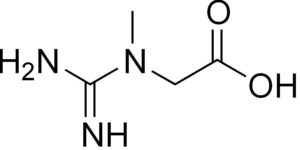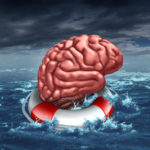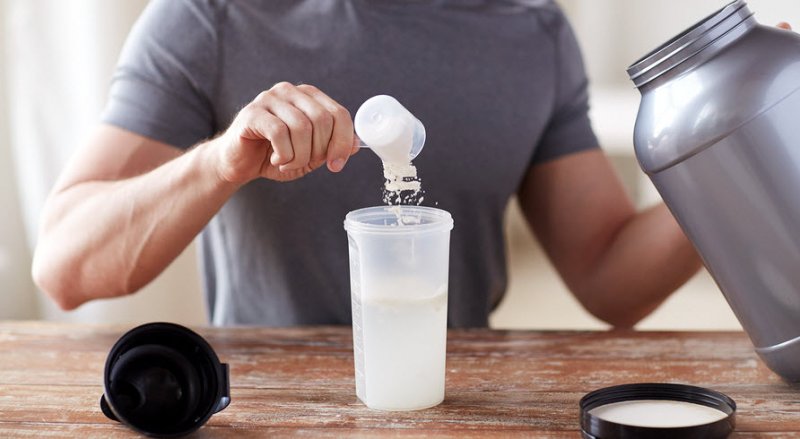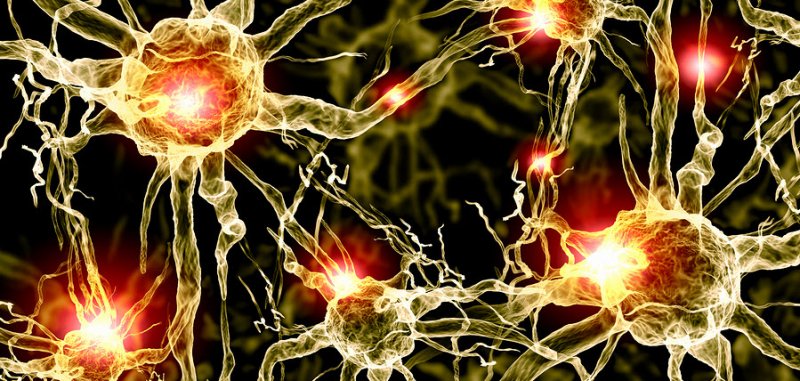Table of Contents
Creatine is one of the most effective cognitive enhancers available. This non-essential amino acid is synthesized in your liver, kidneys and pancreas. And used in your brain to re-charge the Adenosine Triphosphate (ATP) that is produced by mitochondria in brain cells.
Creatine is stored in your body as phosphocreatine. When ATP is used as an energy source in your neurons, it loses a phosphate molecule. Turning it into adenosine diphosphate (ADP).
Creatine steps in and offers ADP a phosphate molecule. Turning it back into ATP to be used again to fuel brain cells. Creatine essentially re-charges the fuel cells in your neurons.
Creatine is critical for mental energy, neurotransmitters, as a neuroprotectant and anti-oxidant.
Creatine helps:
- Brain Energy. Creatine can reduce mental fatigue. Creatine re-charges ATP which is the fuel source for your brain cells.
- Neurotransmitters. Creatine re-charges ATP which is directly involved in producing, packaging and secreting neurotransmitters. Creatine boosts intelligence, improves memory, facilitates faster thinking, and improves mood.
- Neuroprotectant. Creatine fuels ATP, and boosts cellular metabolism which helps protect against neuronal damage from toxins. And improves cognition.
Overview
Creatine is an amino acid that’s synthesized in your kidneys, liver and pancreas. It’s produced from the amino acids methionine, glycine and arginine. You can also get creatine from eating wild game, red meat, eggs and fish. Or a supplement.

Creatine is stored in your body as creatine phosphate, or phosphocreatine. And is critical for creating Adenosine Triphosphate (ATP) which is synthesized in mitochondria in your brain cells.
Here’s how it works…
ATP is the primary energy molecule used in your cells as energy. ATP is your body’s natural fuel source. ATP is broken down to produce biochemical energy throughout your body. Including in your brain cells.
During this biochemical process, ATP loses one of its phosphate molecules. And is changed to adenosine diphosphate (ADP). This is where creatine steps in.
Remember, creatine is stored in your body as creatine phosphate. It re-charges ADP by donating a phosphate molecule to ADP. Which produces more ATP that can be used to make more energy.
Without creatine to re-charge ATP, your brain’s cells are literally starved for energy.
Creatine Monohydrate vs. Buffered Creatine vs. Creatine Ethyl Ester: What’s the Difference?
It’s easy to get confused by the many forms of creatine available. And how to know which one works best in your nootropic stack. Well, let’s get past all the marketing hype, and settle this now.
 Creatine is one of the most well-researched supplements in the world. Thanks in large part to the sports-nutrition world.
Creatine is one of the most well-researched supplements in the world. Thanks in large part to the sports-nutrition world.
Creatine monohydrate is the form used in most of the clinical studies on creatine. It’s the gold standard of creatine. And has been proven over decades of use.
Buffered creatine is marketed as being able to outperform creatine monohydrate because of its higher pH level. But research does not back up this claim.
Researchers in the Exercise and Sport Nutrition Laboratory at Texas A&M University conducted a double-blind study with 36 resistance-trained athletes.
They tested creatine monohydrate (Creapure®) against buffered creatine (Kre-Alkalyn®). Following manufacturer’s directions for loading and maintenance phases. And ran the trial for 28-days.
The research team concluded there was no evidence that supplementing with a buffered form of creatine resulted in fewer side effects. Or that the buffered form was more efficacious and/or safer than creatine monohydrate.[i]
Creatine Ethyl Ester is another form of creatine that is supposed to convert back to usable creatine once in your body. It’s marketed as having better absorption than creatine monohydrate. But the research shows it’s actually less effective. Because once in your body, it’s converted into an inactive form called “creatinine”.[ii]
The bottom line is don’t overpay for fancy forms of creatine. No matter how good the marketing hype.
Creatine monohydrate is still the least expensive and most effective form of creatine available today.
How does Creatine Work in the Brain?
Creatine boosts brain health and function in several ways. But two in particular stand out.
- Creatine levels linked to optimal memory ability and retention.
One study at the University of New Mexico investigated working memory ability. Or the brain’s ability to hold information for future use. Scientists studied children’s brains aged 7 through 12 using magnetic resonance spectroscopy. And measured various brain neurochemicals.
The study found that children with the highest levels of creatine in their brain had a better working memory. And concluded, “… we speculate that higher resting creatine levels may allow for greater in-task activation [and] facilitate processing.”[iii]
- Creatine directly impacts mental fatigue.
Another study published in Neuroscience Research examined the effects of supplemental creatine on mental fatigue. 24 healthy adults participated in this double-blind, placebo-controlled study.
In this study, the adults who took 8 grams of creatine daily for 5-days showed significantly less mental fatigue while performing math than those who took no creatine.[iv] The research team said that creatine appeared to help increase oxygen utilization in the brain.
How things go bad
ATP and creatine are critical to brain function. If you don’t have adequate creatine to recharge ATP, your brain can’t function at its best.
And certain genetic disorders can interrupt brain creatine metabolism. Causing significant neurological defects.
Lack of ATP and creatine will affect neuron repair, and the production and transmission of neurotransmitters.
If a creatine deficiency is caused by a genetic defect early in life, it can result in developmental delay, mental retardation, speech disabilities and muscle weakness.
↓ Cognition, memory, recall, reaction time and mood diminish
↓ Brain cell membranes degenerate
↓ Neurotransmitter levels decline
↓ Mental health, language and fine motor skills decline[v]
All of these changes in brain energy metabolism are contributing factors to neurodegenerative diseases, including Alzheimer’s, Parkinson’s, ALS, epilepsy, and dementia.
But even if you’re not concerned with genetic defects, or the effects of aging, Creatine can help.
Creatine benefits
Study after study shows that creatine supplementation has a significant impact on working memory and intelligence. Both tasks that require mental speed of processing.
Creatine supplementation plays a major role in brain energy capacity. And influencing brain performance.
You may find it curious that researchers who study cognition and athletic performance seem to favor using vegetarians and vegans. And giving them creatine supplements.
They use vegetarians as test subjects because creatine is only found in animal flesh. And vegetarians don’t eat meat.
Creatine is not an essential amino acid because we can synthesize it from other amino acids. But amino acids found in plant foods are not synthesized very efficiently. This is the reason why vegetarians have lower creatine levels in their bodies than those of us who eat meat.
Our cells run on energy supplied by ATP. We burn ATP energy when using our muscles. But we go through ATP faster when we use our brains.
Consider that our brain only makes up about 1 – 3% of our body weight. But the billions of neurons in our brains use 20% of our body’s total ATP-derived energy.
ATP energy is used in your brain for neuronal repair. And to produce, package and secrete neurotransmitters. It’s the power behind bioelectrical signals when neurons communicate with each other.
During this neuronal activity, ATP loses one of its phosphate molecules. And is changed to ADP. Creatine is needed to recharge ADP by donating a phosphate molecule. So you can use that ATP energy again.
This is why every neurohacker should have creatine as part of their nootropic stack.
Creatine and depression. One animal study demonstrated Creatine activates both adenosine A1 and A2a receptors similar to ketamine. And may provide an antidepressant benefit similar to ketamine.
How does Creatine feel?
Once you start supplementing with creatine, you should experience improved cognitive function. Thinking will be clearer and faster.
Mental energy will get a boost. And you won’t feel mentally wasted after an intense mental workout.
Reading should be easier and you won’t find yourself re-reading that last sentence or paragraph.
Overall, you should feel a boost in both physical and cognitive abilities. And an improvement in your sense of well-being. You’ll feel better!
Creatine Clinical Research
Creatine was identified way back in 1832. And science has been researching it in every way possible since then. Thousands of studies have been done on physical and brain health. And how they’re related to creatine.
Creatine Boosts Working Memory & Intelligence
A research team at the University of Sydney decided to test the effect of creatine supplementation in 45 young adult vegetarians. People who stick to a vegetarian diet are typically deficient in creatine. Because red meat is a main source of this critical nutrient in our diet.
In this double-blind, placebo-controlled trial they gave some of the young adults 5 grams of creatine once a day for 6 weeks. Then they tested for intelligence and working memory performance.
The researchers found that creatine supplementation had a significant positive effect on both working memory and intelligence. Both methods that they used to test the subjects required speed of processing.
The research team concluded brain energy capacity has a profound role influence on brain performance. And that brain energy relies on creatine.[vi]
Creatine Increases I.Q & Attention Span
Scientists at the University of Sunderland in the U.K. conducted a double-blind, placebo-controlled study. Working with 34 healthy men and women with a mean age of 21 years. None of the participants were vegetarian.
One group took 5 grams of creatine daily for 2 weeks. And the other group took a placebo. They were tested before supplementation. And then after 2 weeks of using either creatine or the placebo.
The tests consisted of Memory Scanning, Number-Pair Matching, Sustained Attention and Arrow Flankers, followed by an IQ test. These tests were mentally strenuous by any standard.
The researchers concluded that those taking creatine tested much better, and showed less mental fatigue than the placebo group. Creatine increased attention span, I.Q, and working memory.[vii]
Creatine Repairs Brain Cells
Drugs currently used to treat neurodegenerative diseases like Parkinson’s and Alzheimer’s provide temporary relief of symptoms. But do not stop the underlying cause of the disease.
Scientists are now working on therapies that focus on replacing injured and dead brain cells. And boosting growth factor along with other neurotrophic molecules.
These new therapies include developing vaccines. And using compounds like creatine to immunize against these life-threatening diseases.[viii]
One thing scientists know for sure is impaired energy metabolism plays a prominent role in many of these neurological diseases. Recent studies show impaired energy production in the brain causes neuron cell death.
Optimal levels of ATP are crucial to maintaining healthy brain cells. And creatine is a critical in maintaining cellular energy levels.
Supplementing with creatine has been proven for neuroprotection in a wide range of neurodegenerative diseases. Including Parkinson’s, ALS, Alzheimer’s, stroke and epilepsy.[ix]
Creatine Recommended Dosage
Recommended dosage of creatine for nootropic benefit is 5 grams per day.
Studies show that creatine should be consumed with carbohydrates for best absorption.[x]
The myth that you should not take creatine with caffeine is exactly that – a myth. No reliable study has shown this to be true.
Creatine Side Effects
Creatine is produced naturally in your body. So is considered well-tolerated and safe.
But over-consumption of creatine can be hard on your kidneys and liver. These organs are creatine factories. And too much creatine can overwork them. If you are dealing with liver or kidney problems, talk to your doctor before supplementing with creatine.
Pure creatine is the safest. But many commercially available creatine supplements contain contaminants. Check the labels carefully. Review the manufacturer’s website and any other material they offer that attests to their quality standards.
Other side effects can include mild diarrhea, gas, upset stomach or stomach cramps, muscle cramps, increased urination, headaches, reduced appetite and water weight gain. Usually when using too much creatine. Or during the “loading” phase of creatine supplementation.
Because creatine causes an energy boost in many neurohackers, avoid dosing in the evening. Or you may find difficulty getting to sleep.
NOTE: a large 2016 clinical study found that Creatine supplementation when combined with daily Caffeine (300+ mg per day) use increased the progression of Parkinson’s Disease. So if you have Parkinson’s Disease and use caffeine (i.e. several cups of coffee) in any form you should avoid supplementing with Creatine.
Type of Creatine to buy
The best dietary source of creatine is found in wild game. Other sources include red meat and certain fish.
The most common and least expensive form of creatine available as a supplement is in powder form. It’s also available in capsules and a liquid.
I recommend skipping all the creatine nitrates, ethyl esters, malate, HCL’s and others – and stick with creatine monohydrate in powder form.
I use and recommend: Click for Onnit® Creatine
Nootropics Expert Recommendation
Creatine 5 grams per day
 I recommend using Creatine as a nootropic supplement.
I recommend using Creatine as a nootropic supplement.
Your body does make some creatine on its own. And from the food you eat. But if you’re a vegetarian, or don’t get enough quality creatine in your diet every day, you will benefit by adding creatine to your nootropic stack.
Creatine is critical for fueling the activity in your neurons needed for cognition, memory, critical thinking, decision-making and more.
Creatine is especially helpful if you’re dealing with fatigue. Or putting unusually high demands on your brain. Resulting in mental fatigue.
Studies have shown creatine can help prevent a host of neurodegenerative diseases as well.
We suggest a dose of 5 grams daily. It takes a while for creatine to build up in your system. So if you’d like to get the benefits faster, load with 20 grams a day for a week. And then pull back to a maintenance dose of 5 grams daily.
And Creatine is a great compliment to a stack including any nootropic from the racetam-family. Anything that causes an increase in uptake of acetylcholine in your brain. And an increase in mental processing.
You need to provide your brain with the fuel it demands. And creatine is a proven way to do it.
I use and recommend: Click for Onnit® Creatine








Join The Discussion - 90 comments
Julia A Hodgson
April 15, 2025
I did read the article and apparently, so did Shane and Debbie. In one statement you say that “The myth that you should not take creatine with caffeine is exactly that – a myth. No reliable study has shown this to be true.“ and then you advise Debbie
“Debbie, it is absolutely safe if you don’t use any form of caffeine.”
Can you see the problem? I have one nice cup of coffee in the morning with real cream, and nothing after that. When is it safe to take the 5mg of creatine?
David Tomen
April 18, 2025
Julia, I don’t remember that comment with Debbie but it is likely taking it out of context. You will not have a problem supplementing with Creatine even if you mix it in with your coffee.